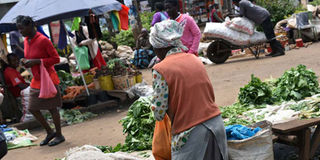Normal service will resume shortly after the repeat elections

Traders carry on with their businesses at Kangemi market in Nairobi on November 2, 2017. After two presidential elections in two months, Kenya is experiencing its normal service moment. PHOTO | ANTHONY OMUYA | NATION MEDIA GROUP
What you need to know:
- Strikes are only a temporary bump that will be smoothed over in a few months.
- The country is pregnant with the expectant hope for a moment of greatness from the current hiatus.
Colour bars streak down to the bottom of the black-and-white screen on the Great-Wall-of-China television set in the full, unseen glory of the rainbow to signal the start of broadcast transmission.
Until the liberalisation of the airwaves in 1990, Broadcasting House, home to the Voice of Kenya, ruled the roost in information and entertainment — doled out in strict doses between 4pm when the lone station opened and midnight when it closed, with an extended four hours of daylight broadcast on weekends and public holidays.
Every so often, in between the colour bars at the start and end of broadcasts, a hail of snowstorms and grainy showers would interrupt the balmy regularity by raining down the television screens sets, followed by the reassuring message: ‘Normal Service Will Resume Soon’.
Once, Normal Service ruled the screen for a week.
ELECTIONS
In the nail-biting anxiety of wondering if Big Daddy and the Undertaker would make a comeback during the World Wrestling Federation bouts, or episodes of Crown Court or Vitimbi, ‘Normal Service’ became a period of furlough filled with creative genius.
For years at Starehe Boys’ Centre, Normal Service was the title of an annual performing arts extravaganza that ran all of four hours fitting together a mosaic of one-act plays, poetry recitals, choral singing, dramatic skits and parody of the like that spoofed the teachers and other staff to great hilarity.
After two presidential elections in two months, Kenya is experiencing its normal service moment.
MONEY
Despite the hardships of conducting two elections back-to-back, Kenya is the third easiest country to do business in all of Africa, having climbed 12 paces in the past year to be ranked 80th globally.
A Human Rights Watch report released last week reveals that survivors of election-related rape in Nairobi’s Mathare area paid up to Sh4,000 for the P3 police pro forma used to record injuries; in Bungoma, it was cheap at Sh1,200, considering that the women wanted to make reports against police officers.
Trains are shunting passengers between the capital city and the coastal city of Mombasa at a fraction of the bus fare.
Money will be flowing into the counties again, paying delayed salaries for public servants who will in turn borrow from banks and finance agriculture, small business and other micro enterprises.
MAIZE SUBSIDY
Strikes are only a temporary bump that will be smoothed over in a few months.
These tensions are the germs in whose soil great societies and the economies that sustain thrive.
Government has been on its best behaviour, subsidising the staple maize meal to keep it retailing at Sh90 long after the year’s crop has come in.
Young men keen to burn extra calories are pushing police water cannon trucks out of ditches so they can be assaulted with water jet-streams from a comfortable distance while others are forming cooperative societies to build grand slings to deploy boulders against oncoming riot troops.
UNEMPLOYMENT
This is how constant contact between the security services and unemployed youth can help the practice of community policing to take root.
With the practice youth are getting on the streets, it will not be long before the Ndengu Squad of lentil eaters reassembles at the National Youth Service before being deployed to building muscles digging trenches along village paths.
School going children sitting their examinations are preparing to make returns of D-minus in readiness to swell the ranks of the productive labour market.
The country is pregnant with the expectant hope for a moment of greatness from the current hiatus.
It is the surest sign that in government, normal service will resume shortly.
The writer is a Programme Advisor, Journalists for Justice. The views expressed here are his own and do not reflect those of JFJ. [email protected]





